| Srl | Item |
| 1 |
ID:
181993
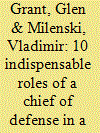

|
|
|
|
|
| Summary/Abstract |
New democracies face significant difficulty in understanding the position of the Chief of Defense (CHOD) and its difference from the traditional/historical role of Chief of the General Staff (CGS). Many of those states attempted to transition from CGS to CHOD upon the advice from Western allies. This move usually followed critical failures in the defense systems. These failures often occurred after bad political decisions regarding the armed forces because the political leadership was in the dark about their true condition. The role of the CHOD, as envisaged and implemented in most long-standing democracies, is designed both to solve this deficiency and to ensure that the armed forces are fit for the future. This article outlines how and why this is the case and identifies precisely what it is that a CHOD should do.
|
|
|
|
|
|
|
|
|
|
|
|
|
|
|
|
| 2 |
ID:
086962
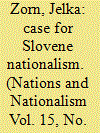

|
|
|
|
|
| Publication |
2009.
|
| Summary/Abstract |
When Slovenia became a sovereign state in 1991, it had to define who its citizens were. Were all residents of Slovenia, regardless of their ethnic belonging, equal in this respect? This article provides an answer to this question by elucidating certain parts of the secession legislation - the initial designation of citizenry and one of its indirect outcomes, the erasure from the register of permanent residents. The ethnic/civic dichotomy will be applied in order to demonstrate opposing nationalist claims made by the ruling elite. In terms of specific processes, Slovene nationalism will be presented in three distinct phases: counter-state nationalism (before the break-up of Yugoslavia), state-building nationalism (the initial designation of citizenry), and the nationalising state (after the secession; marked by the erasure and threats to revoke citizenship statuses of naturalised citizens).
|
|
|
|
|
|
|
|
|
|
|
|
|
|
|
|
| 3 |
ID:
098360
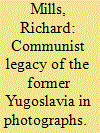

|
|
|
|
|
| Publication |
2010.
|
| Summary/Abstract |
It is impossible to travel through the former Yugoslavia without constant reminders of the region's recent past. Socialist-era buildings retain their prominent city centre locations in the capitals of all of the successor republics, whilst the countryside remains littered with monuments honouring the achievements of Tito's victorious Partisan Army. There is also no escaping Yugoslavia's violent dissolution, with many villages, towns and cities still struggling to come to terms with the physical damage inflicted by war. The following photographic selection attempts to offer a brief insight into those relics of the past which, through their physical presence, continue to have an impact upon the present day. These photographs were taken by the author between 2007 and 2009.
|
|
|
|
|
|
|
|
|
|
|
|
|
|
|
|
| 4 |
ID:
118666
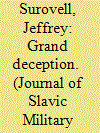

|
|
|
|
|
| Publication |
2012.
|
| Summary/Abstract |
It has long been widely assumed that Russia has been an ally of the Serbs and that it was in particular an anti-Western supporter of Belgrade during the wars of the 1990s. In fact, Russia, in cahoots with the Western powers and NATO, played a game of deception to make it appear that it was 'anti-Serbian' when in reality it acted as 'errand boy' in order to fulfill the West's objectives in the former Yugoslavia.
|
|
|
|
|
|
|
|
|
|
|
|
|
|
|
|
| 5 |
ID:
081993


|
|
|
|
|
| Publication |
2008.
|
| Summary/Abstract |
Suspected war criminals who remain at large can do great damage to post-conflict, peace-building efforts. I develop a model of war criminal apprehension predicated on the behavior of international actors to alter the cost/benefit calculus of suspected war criminals and their supporters and make them either more susceptible to capture or make them more likely to surrender. I test this model with duration analysis using data from the International Criminal Tribunal for the Former Yugoslavia regarding the indictment and capture/surrender (if achieved) of over 100 individuals wanted for war crimes, crimes against humanity and genocide. The results demonstrate that not only is it possible to model these phenomena, but that there are a variety of actions the international community can take to facilitate the capture and surrender of suspected war criminals.
|
|
|
|
|
|
|
|
|
|
|
|
|
|
|
|
| 6 |
ID:
078972
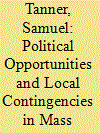

|
|
|
|
|
| Publication |
2007.
|
| Summary/Abstract |
Participation in mass crime is often approached from a top-down perspective that centralizes the actions of the masses under the order of elites and leaders. While there is some evidence to support this approach, a more complete assessment of participation in mass crime must also consider the grassroots contingencies that unite the collective motivation and capacity that induce such actions. Such a bottoms-up approach is developed in this article with a particular focus on the personal experiences of former Serbian militiamen who took part in scenes of mass violence in Croatia and Bosnia-Herzegovina. Interviews with former militiamen illustrate how political opportunities, diverging nationalistic attitudes, proximity to growing violence in increasingly localized killing fields, incentives to participate in parallel criminal activities, and an influence within community networks that were submerged in mass crimes united to legitimize and facilitate their personal commitment to the events that took place in this region during the 1990s
|
|
|
|
|
|
|
|
|
|
|
|
|
|
|
|
| 7 |
ID:
171805
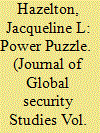

|
|
|
|
|
| Summary/Abstract |
The empirical research in this issue explores sources of security and insecurity to reveal paradoxical relationships and dangerous assumptions. Drawing on this research and earlier findings about international and intra-state security, I argue that inclusion can drive insecurity and exclusion can support security. It is normatively appealing to believe that inclusion increases security in ways that benefit humans and polities and that exclusion decreases security. Authors here, however, find that it is not necessarily so. The key to increasing security as a positive good lies in understanding the actors' interests and goals. Some states and non-state actors may want to increase security in ways that do not benefit all. Others may profit by increasing insecurity. Some actors may seek inclusion while others prefer exclusion of self or other. The articles in this issue underline the importance of accurately identifying and examining assumptions in scholarship and policymaking.
|
|
|
|
|
|
|
|
|
|
|
|
|
|
|
|
| 8 |
ID:
121870


|
|
|
|
|
| Publication |
2013.
|
| Summary/Abstract |
The Alka is a traditional game in Croatia, held to commemorate the victory of the local warriors of the region of Cetina over the Ottoman army in 1715. The Croatian nationalist discourse of the 1990s tried to reinvent the Alka as symbol of a certain national identity, by nationalising this local event and emphasising its religious aspect. In a period of just over a decade, however, the project of reinventing the Alka has failed completely. This paper analyses the reinvention of the Alka and its failure in order to argue that concrete cases of invented tradition are context dependent and may encounter practical limits.
|
|
|
|
|
|
|
|
|
|
|
|
|
|
|
|
| 9 |
ID:
083293


|
|
|